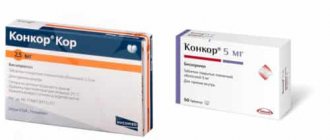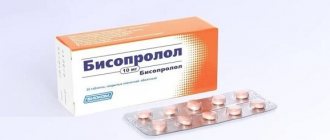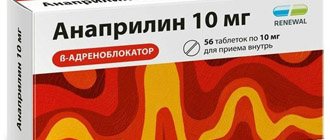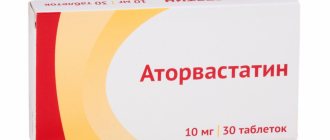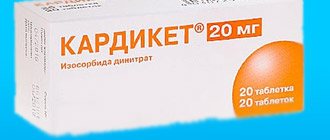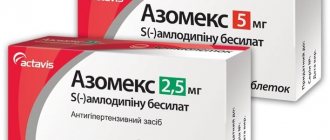Indications for the use of Concor are:
- chronic heart failure;
- cardiac ischemia;
- arterial hypertension;
- sinus, supraventricular and ventricular tachycardias and other rhythm disturbances without ischemic heart disease.
Absolute contraindications to taking Concor:
- severe bradycardia (pulse less than 50 beats per minute);
- high degree atrioventricular block;
- sick sinus syndrome;
- acute or chronic decompensated heart failure.
The possibility of using beta blockers for bronchial asthma is controversial. It is believed that in such cases it is necessary to compare the benefit/risk ratio in each specific case. With regard to peripheral vascular disease and diabetes mellitus, the need for a beta blocker is also determined for the individual patient. You should take the drug with great caution during pregnancy and lactation, and always give preference to a highly selective drug.
The simultaneous use of beta blockers and calcium antagonists such as verapamil and diltiazem is not recommended, since this combination has a negative effect on myocardial contractile function and AV conduction.
Due to the fairly high cost, patients can take fairly effective analogues of Concor at a lower price. There are available domestic and foreign medicines that are almost identical in quality to the original drug.
Concor blood pressure tablets: composition and properties
The active substance of the drug is bisoprolol fumarate. This, as stated, is a selective beta-blocking component with pharmacological activity only in relation to the heart. This makes it possible to use the medicine in a wider number of cases without the danger of side effects (bronchial spasms, sudden jumps in blood pressure and other issues).
The medication is extremely selective, because it has a lesser effect on beta-2 receptors localized in the vessels and bronchi.
Unlike its analogue, Bisoprolol, Concor contains twice as much active ingredient per tablet: 5 mg versus 2.5. This allows you to reduce the number of doses of the drug, but at the same time, precise dosing is somewhat more difficult. In addition to the main active component, the composition also includes additional substances. They do not affect the heart, blood vessels, or myocardial contractility. The goal is different: to give the tablets a complete physical form, improve the bioavailability of the drug, and increase absorption in the gastrointestinal tract.
What does Concor help with?
As for the indications for use of Concor, it is prescribed for diseases such as:
- arterial hypertension;
- ischemic disease;
- acute or chronic heart failure.
Cardiac ischemia
After oral administration, the active substance is almost completely absorbed by the gastrointestinal tract. Food has no effect on this process. So what is the medicine Concor for?
The drug is most often used for high blood pressure. The daily dose is 1 tablet. It is recommended to take it with a small amount of clean water, preferably in the first half of the day. This can be done before, during or after breakfast. Do not chew it or grind it into a fine powder. In this case, it will be difficult to achieve the desired effect. For arterial hypertension and coronary heart disease, the dose should be selected only by a cardiologist. This is done taking into account the patient’s well-being.
It is not recommended to use Concor at low pressure, as it can drop to extremely dangerous levels. If necessary, the minimum dose can be approximately doubled - that is, up to 10 mg per day. If the goal is not prevention, but appropriate therapy for high blood pressure, then you should start taking Concor with 20 mg. An important point in the treatment of chronic heart failure is a stable course of the disease without signs of exacerbation. The initial dose should be no more than 1 mg per day.
General information about Concor
The active component of the drug is bisoprolol, which has antiarrhythmic, antihypertensive, and anti-ischemic effects on the body.
This medicinal product belongs to the group of beta blockers, which can act on the nerve endings of the heart, which in turn are extremely sensitive to adrenaline. Adrenaline itself is a stress hormone produced, which is primarily released by the body when it senses danger. This condition is accompanied by dilated pupils, higher than normal blood pressure due to vascular stenosis, as well as rapid contraction of the heart muscle.
At the same time, Concor is able to suppress the effect of adrenaline, bringing the body back to normal and calming its systems.
Among the indications for use of the drug:
- chronic cardiac ischemia;
- angina pectoris;
- congestive heart failure;
- hypertension of primary and secondary type.
What is it prescribed for?
At first glance, it seems that this drug only worsens heart function. What good is it if the heart doesn’t beat as “powerfully”? Will his weakness help cure diseases? It turns out that it will not only help, but it is also necessary. After all, if the heart does not contract as strongly as before and not as often, then it requires less oxygen. It is this fact that is critical in the progression of coronary heart disease. After all, a heart attack is nothing more than acute “oxygen starvation” of the heart muscle, which leads to its death.
As for the antiarrhythmic effect, everything is clear here too: slowing down the impulse through the conduction system of the heart increases its “quality”. If you speak the tongue twister slowly and carefully, then everything works out. It’s the same with the heart impulse. At high speed, failures and the appearance of tachyarrhythmias are possible - for example, tachyform of atrial fibrillation. "Concor" makes the conduction impulse from the atria to the ventricles slower, but more complete.
While taking Concor (and drug analogues), the heart “rests” more, and this leads to an increase in its reserve capacity and a decrease in the clinical severity of the symptoms of the above diseases. Now we know what Concor helps with. Of course, these conditions (hypertension, angina and heart failure) can occur simultaneously in one person. In these cases, monotherapy may be indicated, but most often, the drug is one of the components of complex treatment. Including:
- disaggregants (acetylsalicylic acid);
- ACE inhibitors;
- diuretics;
- cardiac glycosides;
- lipid-lowering drugs (lowering cholesterol levels).
Naturally, only a doctor should prescribe Concor, and if we are talking about the treatment of coronary artery disease or heart failure, then a cardiologist.
Why is Concor prescribed to adults?
Reasons for use are described in the instructions. It is worth clarifying some points and considering them in more detail.
Arterial hypertension
Regardless of stage and origin. As an independent diagnosis or symptom of other disorders. In the early stages, the use of a name may well be isolated. The exclusive use of Concor is not practiced, starting from stage 2 of hypertension and especially later. Medicine will not be enough to correct the condition, since irreversible organic changes begin in the heart and blood vessels. Parallel use of calcium antagonists, ACE inhibitors, centrally acting agents, and possibly diuretics will be required.
It is necessary to carefully select combinations of drugs, because beta blockers, if the accompanying drugs are not chosen correctly, can provoke heart failure, kidney failure, and death from a critical drop in myocardial contractility and stoppage of organ function.
Cardiac ischemia
Accompanied by a gradual disruption of the normal nutrition of cardiac structures. Can be independent. For example, as a result of aging of the body. Or caused by other pathologies: arterial hypertension, previous heart attack. Concor helps against coronary disease due to its ability to optimize metabolic processes. The drug, unlike many other beta blockers, is indicated, among other things, for long-term use. Since it provokes a minimum of side effects, especially if the drug is suitable for a particular patient.
Angina and heart attack
Types of coronary insufficiency. As a rule, beta blockers are prescribed as part of prevention, but are not suitable for the treatment of acute processes. Often completely contraindicated. Further use is possible after the acute condition has passed.
Heart failure, chronic form
The effect is identical to that of ischemic disease.
Sinus tachycardia
Concor is used as part of systematic therapy on a long-term basis. Basically, the drug prevents new episodes.
How to take Concor before or after meals?
Patients often ask when it is better to take Concor in the morning or evening, whether it can be taken in the evening and at night. Doctors strongly advise using the product in the morning. To the question of how to take Concor before or after meals, any cardiologist or therapist will definitely answer: before or during a meal. Swallow the tablet whole with water. The amount and method of using this drug directly depends on the patient’s pathology.
Only a doctor can reliably tell you how to drink Concor for hypertension during an examination or consultation. Usually, the doctor prescribes the dose individually, guided by data on the pulse, the severity of symptoms, and the patient’s condition.
Often start with 5 mg once a day.
Sometimes, with a mild course, half a tablet is enough for patients. In more severe conditions, the dosage is doubled (10 mg once a day). A further increase in the daily use of the medicine is permissible in exceptional cases, at the discretion of the physician. The maximum dose is 20 mg. The doctor adjusts the regimen for how to take Concor with high blood pressure, based on the therapeutic effect obtained, heart rate.
Traditionally, therapy for this diagnosis includes beta-blockers, diuretics, and ACE inhibitors. At the beginning of treatment with Bisoprolol, a special titration stage is carried out under the close supervision of a specialist. A prerequisite for making a decision on inclusion in the Concor regimen is CHF without exacerbation. To ensure that the patient undergoes the titration phase correctly, the initial dosage of the drug is 1.25 mg.
Every two weeks, subject to normal tolerance, the amount of the drug is increased according to the following principle: 2.5 mg, 3.75 mg, 5 mg, 7.5 mg, 10 mg. If during the next dose increase the patient feels a significant deterioration, the daily consumption of the drug is reduced or the condition is corrected with the help of other means included in the treatment regimen.
Mode of application
The tablets should be taken with a small amount of liquid, without chewing, in the morning before, during or after breakfast. Treatment should be started mostly gradually, with small doses, which are then increased. In all cases, the dose should be selected individually, taking into account the pulse rate and therapeutic effect.
Treatment of arterial hypertension The recommended dose of Concor® is 5 mg once a day. For mild forms of hypertension (diastolic blood pressure up to 105 mmHg), therapy with a dose of 2.5 mg once a day may be sufficient. If necessary, the dosage can be increased to 10 mg once a day. Further increases in the dose should be justified and carried out in exceptional cases.
The maximum recommended dose of Concor® is 20 mg once daily. Coronary heart disease (angina) The recommended dose of Concor® is 5 mg once a day. If necessary, the dosage can be increased to 10 mg once a day. Further increases in the dose should be justified and carried out in exceptional cases. The maximum recommended dose of Concor® is 20 mg once daily.
Dosage for hepatic and/or renal insufficiency Patients with mild or moderate hepatic or renal dysfunction usually do not require dosage adjustment. For patients with severely impaired renal function (creatinine clearance <20 ml/min) and patients with severely impaired liver function, the maximum daily dose is 10 mg.
There is only limited experience with the use of Concor® in dialysis patients, which does not indicate the need for dosage adjustment. Treatment with Concor® should not be abruptly stopped, especially in patients with coronary heart disease, as this may lead to an acute deterioration in the patient's health. If interruption of treatment is necessary, the dose should be reduced gradually (eg, halving the dose once a week).
Features of using Concor
The original drug must be taken every day in the morning, before breakfast or during meals, remembering to drink small amounts of water. The dose should always be selected exclusively by the doctor and individually for each patient.
Therapy begins with the lowest dose, which is gradually increased to the optimal level.
Abrupt cessation of therapy is strictly contraindicated, as this may sharply worsen the condition. For this reason, drug withdrawal should be accompanied by a gradual reduction in the dose of the drug in order to provide adaptive opportunities for the body.
Concor tablets: contraindications
According to the annotation for the drug, the use of Concor is contraindicated in:
- The presence of hypersensitivity to bisoprolol;
- Acute and decompensated chronic heart failure;
- Cardiogenic shock;
- Bradycardia, if the heart rate does not reach at least 40 per minute;
- Sick sinus syndrome;
- AV blockade of the second and third degrees;
- SA blockade;
- Prinzmetal's angina;
- Arterial hypotension, if blood pressure does not reach 90 mm Hg. (especially with myocardial infarction);
- Cardiomegaly without signs of heart failure.
Concor should not be taken simultaneously with MAO inhibitors and during lactation. According to vital indications, the drug is prescribed, but with great caution and under the constant supervision of a doctor:
- If you have a history of allergic reactions;
- Patients with chronic obstructive pulmonary diseases, including bronchial asthma and emphysema;
- Patients with diabetes mellitus;
- People with chronic heart failure;
- With metabolic acidosis;
- For obliterating diseases of peripheral vessels, including Raynaud's syndrome and intermittent claudication;
- Patients with liver failure;
- With pheochromocytoma;
- With depression (including a history);
- Persons with thyrotoxicosis;
- For psoriasis;
- Pregnant women;
- Elderly people;
- Children and adolescents under 18 years of age (due to the lack of data on the effectiveness and safety of use).
Generics Concor
By generics we mean those substitutes for Concor that have a similar composition. Their main advantage is a much lower cost when compared with the original product. Lower prices can be achieved due to the fact that manufacturers do not need to spend money on developing a formula and subsequent testing of the resulting medicine.
Among the well-known generics are:
- Niperten. The medicine is produced in Russia in dosages similar to Concor - 2.5, 5 and 10 mg. The tablets have some differences in shape.
- Bisoprolol. The most popular domestic generic, sold at a very low price.
- Coronal. Slovak product, available in dosages of 5 and 10 mg.
- Biprol. A cheap, domestically produced drug, available in dosages of 2.5, 5 and 10 mg.
- Bidop/Bidop Cor. Not a very popular Irish product, available in three different dosages. It has a fairly attractive price tag.
- Cordinorm. Icelandic remedy in the form of film-coated tablets with a dosage of 5 and 10 mg.
- Aritel/Aritel Cor. Excellent products produced in the Moscow region and sold at an affordable price. Dosages correspond to Concor and Concor Cor.
- Bisogamma. A German-made product sold at a fairly affordable price.
- Biol. A Slovenian-made generic, produced in tablets of 5 and 10 mg.
- Bicard-LF. There are also Belarusian generics of the drug in question on the market. Available in tablet form (30 pieces in one package).
All the drugs mentioned above have similar contraindications for use. In particular, use is not recommended in the following cases:
- deficiency of blood supply due to acute myocardial dysfunction, cardiogenic shock, impaired conduction of the heart muscle, severe hypotension, bradycardia;
- obstructive pulmonary disease of chronic form, bronchial asthma in complex forms, serious disruptions in the process of peripheral circulation;
- minor age.
During pregnancy and during the lactation period, use should be carried out with extreme caution.
Side effect of the drug
Even with proper use and strict adherence to the dosage, the drug Concor can cause the following side effects:
- from the gastrointestinal tract: nausea, vomiting, constipation, diarrhea, liver dysfunction, pain in the epigastric region, dry mouth, changes in taste;
- from the central nervous system: headaches, migraines, dizziness, loss of consciousness, weakness, increased fatigue, insomnia or drowsiness, nightmares, hallucinations, depressive states, causeless anxiety, feelings of panic, convulsions, memory impairment, myasthenia gravis, asthenia;
- from the cardiovascular system: a sharp decrease in blood pressure, attacks of bradycardia, increased heart rate, vasospasms, exacerbation of chronic heart failure, numbness of the extremities;
- from the organs of vision: increased lacrimation, dry eye mucosa, inflammation of the conjunctiva, blurred vision;
- from the respiratory system: runny nose, nasal congestion, shortness of breath, bronchospasms;
- from the senses: impaired or partial loss of hearing;
- from the musculoskeletal system: muscle weakness, leg cramps, arthralgia, pain in the back;
- from the skin: exacerbation of psoriasis, baldness, hyperhidrosis;
- allergic reactions: itching and rashes on the skin (urticaria), swelling and redness of the skin, allergic rhinitis;
- changes in blood parameters: increased levels of AST and ALT enzymes, decreased platelet counts, decreased leukocyte levels, increased triglycerides.
Side effects of Concor Cor (differing in the dosage of the active substance) are similar.
Interaction with other drugs
Using Concor with certain medications may lead to a decrease in its effectiveness or other undesirable effects. Class I antiarrhythmic drugs (for example, quinidine, phenytoin, propafenone and others) when taken with Concor can reduce the contractility of the heart and reduce its atrioventricular conduction, which can cause heart block. Their simultaneous prescription by many doctors is considered inappropriate and dangerous. Concor also does not combine well with some slow calcium channel blockers (diltiazem and verapil) - their combined use can cause a decrease in myocardial contractility, impaired atrioventricular conduction and subsequent heart block.
It is especially not necessary to administer intravenous verapamil to patients taking Concor and other drugs of the beta-blocker group - since the likelihood of developing not only atrioventricular block, but also severe hypertension increases.
Centrally acting antihypertensives (such as clonidine, meldopa and others) when taken with Concor can cause a critical decrease in heart rate and cardiac output. When taken with amlodipine, nifedipine, beta-blockers (eg, eye drops for the treatment of glaucoma) and any antihypertensive drugs (including drugs that have an antihypertensive effect as a side effect), the fall in blood pressure will be greater, which can lead to arterial hypertension. hypotension.
Concor: analogues and substitutes
The medicine is used for arterial hypertension, CHF and coronary artery disease. Accordingly, what can replace Concor depends on the disease, contraindications, and concomitant therapy. The choice is made by a cardiologist based on medical history and research. List of analogues and substitutes for Concor:
| Analogue | Price, in rubles | Manufacturer country |
| Concor | 160-810 | Germany or Russia |
| Coronal | 110-510 | Slovakia |
| Lorista | 160-1190 | Slovenia or Russia |
| Bisoprolol | 30-310 | Russia |
| Nebilet | 550-1150 | Germany |
| Nebivolol | 350-590 | Russia |
| Anaprilin | 15-40 | Russia |
| Metoprolol | 30-350 | Russia |
| Betalok zok | 150-470 | Sweden or Russia |
| Egilok | 110-210 | Hungary |
| Amlodipine | 40-210 | Russia, Macedonia |
| Verapamil | 40-160 | Russia |
| Carvedilol | 190-290 | Russia |
Other analogues
- Lorista (Losartan) is a substitute for Concor, used for arterial hypertension and to reduce the risk of complications, belonging to the group of angiotensin II receptor blockers. It is the drug of choice for concomitant gout, as it increases the excretion of uric acid.
- Capoten (Captopril) and Enap (Enalapril) are analogues of Concor, used to normalize blood pressure and in hypertensive crisis, the side effect is a dry cough.
- Amlodipine analogue is used for long-term treatment of angina pectoris and hypertension, the substance is part of the combination drug Concor AM, the disadvantage is that it can cause edema.
- Verapamil is a Russian cheap analogue of Concor, the action is similar to Amlodipine, it is rarely used for hypertension, more often for arrhythmia and tachycardia.
- Carvedilol is an analogue with a stronger hypotensive effect.
Other analogues of Concor of the latest generation are Lokren, Coraxan, Sotahexal, Prestarium, Propanorm, Atenolol. All of them have one or a number of therapeutic effects (reduce blood pressure and heart rate, normalize heart rate), differ in indications and features of use.
Substitutes with similar effect
You can replace Concor for hypertension and high blood pressure using drugs that have antihypertensive properties and have a similar composition, indications and principle of action. On the modern pharmaceutical market, analogues of tablets are presented in a wide range, allowing each user to choose the drug that is optimal for themselves in terms of quality and cost.
Captopril
A popular substitute for Concor is the drug Captopril. It reduces blood pressure well and improves well-being in patients with hypertension.
Tablets are contraindicated for users with the following health problems:
- Weak immune system, decrease in the body’s own defenses;
- Individual intolerance and hypersensitivity to captopril;
- Disturbances in the functioning of the gastrointestinal tract.
It is prohibited to use the drug to treat women who are expecting the birth of a baby or who are breastfeeding.
The average price of the analogue is about 100-150 rubles for 30 tablets.
Captopril is one of the main substitutes
Losartan
A cheap Russian analogue of Concor is the drug Losartan. The medication has a minimal range of contraindications, which include individual intolerance, pregnancy and breastfeeding.
Doctors emphasize that tablets replacing Concor in combination with diuretics can lead to a sharp decrease in blood pressure, up to a hypotensive crisis. Therefore, during treatment, it is important to constantly monitor blood pressure levels and adjust the dosage if necessary.
The average cost of Losartan is about 159 rubles per package containing 30 tablets.
Enalapril
The drug Enalapril is synonymous with Concor tablets with a lower, affordable cost. However, this analogue has a fairly wide range of contraindications, which usually include the following:
- Narrowing of the renal arteries;
- Hyperkalemia;
- The patient has a history of swelling of the mucous membranes or skin;
- Waiting period for the baby;
- Breastfeeding;
- Individual intolerance and hypersensitivity to enalapril.
With great caution, the analogue is prescribed to patients with diagnosed diabetes mellitus, cardiomyopathy, liver pathologies, and autoimmune diseases.
The drug Enalapril costs about 60 rubles per pack.
Enalapril - a complete analogue of Concor
Lisinopril
A domestically produced analogue of the drug Concor is the drug Lisinopril. It lowers blood pressure well, but is contraindicated for use in the following cases:
- Oliguria;
- The user is underage;
- Pregnancy;
- Lactation;
- Hypersensitivity and intolerance to lisinopril, the main active ingredient of the tablets.
This analogue of Concor is prescribed extremely cautiously and rarely to persons suffering from coronary artery disease, cerebrovascular disease, due to the increased risks of hypertensive crisis and hypotension.
The average price of Lisinopril is about 100 rubles.
Bisoprolol or Concor: what is the difference
The differences between these drugs are insignificant, since both medications contain the same active ingredient - bisoprolol (Bisoprolol (medicine) is a generic drug - a copy of Concor). Both drugs contain bisoprolol fumarate as an active substance. This compound blocks β1-adrenergic receptors, which leads to vasodilation, a decrease in heart rate (HR) and a decrease in cardiac output. Due to the fact that the heart begins to contract less actively, the cells' need for oxygen decreases.
If the drugs do not differ in their mechanism of action, which of these drugs is better to take in the treatment of diseases of the cardiovascular system? It is impossible to say unequivocally which drug of these two is more effective, since they both contain the same active substance. However, doctors more often prescribe Concor to patients, because it is believed that the quality of imported drugs is slightly better. Can it be replaced with Bisoprolol? The answer to this question is positive, because the mechanism of action of Bisoprolol is the same.
For many years, cardiovascular diseases have held the palm among diseases that often lead to death. Moreover, stroke and heart disease are getting younger year by year. The main risk factors are poor diet, stress, physical inertia, tobacco and alcohol use.
But it is worth remembering that generic drugs differ in effectiveness (by about 5-15%) from the original ones, this is due to cheaper production technology.
The danger of the disease is that it may not make itself felt for a long time, but may appear spontaneously. People suffering from CVD need early diagnosis and assistance by taking medications. Doctors are increasingly prescribing Concor or Bisoprolol for the treatment of heart disease. Which is better and what is the difference between these medications? To resolve this issue, it is necessary to study the composition of both medications.
Is a substitute always worse than a brand name drug?
The only requirement for generic drugs is bioequivalence. The financial costs of producing analogues are always less than for a sample, which explains their lower cost, but the production technology, excipients and shell composition may differ significantly from those of a branded product. Large pharmaceutical companies mostly adhere to accepted production standards and produce high-quality generics, which cannot be unambiguously said about unbranded products. Therefore, replacing the original drug is possible, but not in every case.
